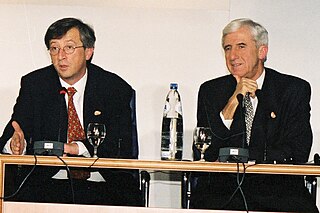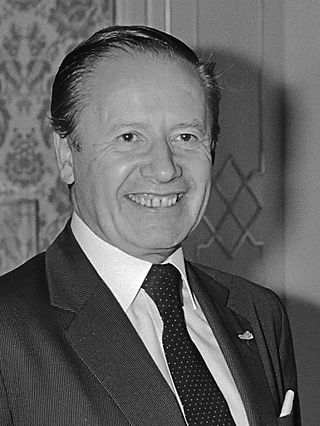Luxembourg is a parliamentary representative democratic monarchy, whereby the prime minister is the head of government, and the multi-party system. Executive power is under the constitution of 1868, as amended, exercised by the government, by the grand duke and the Council of Government (cabinet), which consists of a prime minister and several other ministers. Usually, the prime minister is the leader of the political party or coalition of parties having the most seats in parliament. Legislative power is vested in both the government and parliament. The judiciary is independent of the executive and the legislature.

The Christian Social People's Party is the largest political party in Luxembourg. The party follows a Christian democratic and conservative ideology and has been described as centre to centre-right. Furthermore, akin to most parties in Luxembourg, it is strongly pro-European. The CSV is a member of the Christian Group, European People's Party, and the Centrist Democrat International.

The Luxembourg Socialist Workers' Party, abbreviated to LSAP or POSL, is a social democratic, pro-European political party in Luxembourg. The LSAP sits on the centre-left of the political spectrum.

The Democratic Party, is the major liberal political party in Luxembourg. One of the three major parties, the DP sits on the centre to centre-right, holding moderate market liberal views combined with a strong emphasis on civil liberties, human rights, and internationalism.

Pierre Werner was a Luxembourgish politician in the Christian Social People's Party (CSV) who was the 19th prime minister of Luxembourg from 1959 to 1974 and the 21st from 1979 to 1984.
The National Union Government was a form of national government that governed the Grand Duchy of Luxembourg between 1945 and 13 February 1947, in the direct aftermath of the Second World War. During the war, Luxembourg was invaded, occupied, and annexed by Nazi Germany. Just one of the Luxembourgish casualties of the conflict was the pre-war political system; most of the established parties and alliances disappeared, and some of the leading politicians had lost their lives.
The Party of the Right, abbreviated to PD, was a political party in Luxembourg between 1914 and 1944. It was the direct predecessor of the Christian Social People's Party (CSV), which has ruled Luxembourg for all but fifteen years since.

The Ministry of Foreign Affairs is a ministry of the government of Luxembourg, headquartered in the Bâtiment Mansfeld in Luxembourg City.
Paul Wilwertz was a Luxembourgish politician for the Luxembourg Socialist Workers' Party (LSAP). He was Mayor of Luxembourg City for five years, as well as sitting in the Chamber of Deputies and holding positions in the government.

The first Juncker–Asselborn Government was the government of Luxembourg between 31 July 2004 and 23 July 2009. It was led by, and named after, Prime Minister Jean-Claude Juncker and Deputy Prime Minister Jean Asselborn.

The Juncker–Polfer Government was the government of Luxembourg between 7 August 1999 and 31 July 2004. It was led by, and named after, Prime Minister Jean-Claude Juncker and Deputy Prime Minister Lydie Polfer.

The Juncker–Poos Government was the government of Luxembourg between 26 January 1995 and 7 August 1999. It was led by, and named after, Prime Minister Jean-Claude Juncker and Deputy Prime Minister Jacques Poos.

The Thorn-Vouel-Berg Government was the government of Luxembourg between 15 June 1974 and 16 July 1979. It was led by, and named after, Prime Minister Gaston Thorn. Throughout the term, Thorn's Democratic Party formed a coalition with the Luxembourg Socialist Workers' Party (LSAP). At first, the Deputy Prime Minister was Raymond Vouel, but he left to become European Commissioner in 1976, and was replaced by Bernard Berg.
General elections were held in Luxembourg on 7 June 2009, together with the 2009 election to the European Parliament. All sixty members of the Chamber of Deputies were elected for five years. The polls were topped by the Christian Social People's Party, which built upon its already high number of seats to achieve a commanding victory, with the highest vote share and number of seats of any party since 1954. Incumbent prime minister Jean-Claude Juncker, who was the longest-serving head of government in the European Union, renewed the coalition agreement with Deputy Prime Minister and Luxembourg Socialist Workers' Party leader Jean Asselborn and formed the Juncker-Asselborn Ministry II, which was sworn in on 23 July 2009.

Xavier Bettel is a Luxembourgish lawyer and politician who serves as the 14th deputy prime minister of Luxembourg and as the minister for Foreign Affairs since 2023. He served as the 24th prime minister of Luxembourg from 2013 to 2023. He was a member of the Chamber of Deputies (1999–2013) and Mayor of Luxembourg City (2011–2013).

The Santer-Poos II Government was the government of Luxembourg between 14 July 1989 and 13 July 1994. It was the second of three led by, and named after, Prime Minister Jacques Santer. Throughout the ministry, the Deputy Prime Minister was Jacques Poos.

The Santer-Poos III Government was the government of Luxembourg between 13 July 1994 and 26 January 1995. It was the third of three led by, and named after, Prime Minister Jacques Santer. Throughout the ministry, the Deputy Prime Minister was Jacques Poos.

The second Werner-Schaus Government was the government of Luxembourg between 6 February 1969 and 15 June 1974. Throughout the ministry, the Deputy Prime Minister was Eugène Schaus, replacing Henry Cravatte, who had been Deputy Prime Minister in the Werner-Cravatte Government.

The Werner-Cravatte Government was the government of Luxembourg between 15 July 1964 and 6 February 1969. Throughout its term, the Deputy Prime Minister was Henry Cravatte, replacing Eugène Schaus, who had been Deputy Prime Minister in the first Werner-Schaus Government. It was a coalition between the Christian Social People's Party (CSV), and the Luxembourg Socialist Workers' Party (LSAP).





























